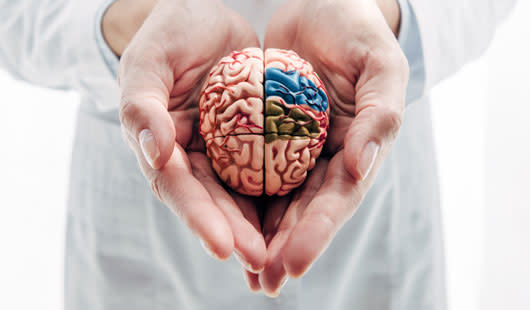Why is brain health so important as we age?
Author Max Gowland, PhD
Last updated 1st December 2020
Over Fifties Health

Why is brain health so important as we age?
Caring for your brain is important, but even more so as we age. It’s one of the most important organs in the human body and one that needs the right nutrition to keep the mind clear and active.
What is the human brain made up of?

Our brain weighs around 1.5 kg and makes up 2% of our body weight. It requires around 20% of the energy produced by the body and therefore requires a large proportion of high-quality nutrients to maintain its efficiency.
The brain consists of around 90 billion neurons that are interconnected via trillions of neuronal bridges or synapses which carry electrical signals throughout the brain.
A surprising fact about the brain is that it is 60% lipid (fat) with a large percentage of this fat being the crucially important Omega 3 DHA (docosahexaenoic acid).
On a daily basis, our brains are under constant attack by damaging oxidation, including the ongoing degradation of DHA within the brain. This degradation means that our DHA needs to be replaced continually and this key nutrient can only come from our diet. It is in effect, essential for the health of our brain and its performance.
How does aging affect the brain?
As we pass the age of 40, the volume and weight of our brain declines by around 5% per decade and progressive neurodegenerative alterations gradually reduce cognitive and functional abilities.
The Journal of International Medical Research in 2007, reported that deficiencies in DHA and other key vitamins and minerals may impair our cognitive performance, resulting in age related cognitive decline.
How can we help support our brain health?
Nutrition plays a key role in maintaining healthy brain function, especially for older people. Our diets can contribute to the way our brain cells communicate, which is why we need to pay close attention to what we eat and specific nutrients.
Omega 3 DHA and EPA Fatty Acids
Omega 3 DHA and EPA fatty acids contribute to the normal functioning of our brain, essential for brain health.
Pantothenic Acid
Also known as vitamin B5, pantothenic acid is a very important B vitamin scientifically proven to contribute to the mental performance of the brain including concentration, learning, memory and reasoning.
Iron, Zinc and Iodine
Together, iron, zinc and iodine support our overall brain health contributing to cognitive function and iodine specifically plays a key role in ensuring the nervous system is functioning normally.
Iron and Vitamin C complex
On an ongoing basis, new red blood cells need to be reformed continually, together with synthesis of haemoglobin as these two blood constituents are essential in transporting oxygen throughout the body, especially the brain.
Vitamin C also plays a secondary role within this process aiding the absorption of iron.
Vitamin C, Thiamine, Niacin, Vitamin B6, 12 and Folic acid
The combination of these nutrients contributes to a normal psychological function and a healthy nervous system.
B6, B12 and Folate
The three essential B vitamins contribute to both new blood cell formation and healthy homocysteine levels within the blood. High levels of this toxic homocysteine are associated with cardiovascular disease later in life and therefore levels need to be controlled. Many older adults fail to absorb enough B12 from food due to low stomach acid and due to the use of some acid depleting medications.
L-Methyl Folate
Many older adults cannot metabolise folic acid from their normal diet due to a common genetic polymorphism, associated with the MTHFR gene. For metabolism to occur fully, our bodies need L-Methyl Folate.
Magnesium
Electrolyte balance within the body is critical to overall mental status and magnesium has been proven to play a key role in its contribution to a healthy electrolyte balance within the brain. Magnesium also plays a role in ensuring a normal psychological function too.
Acetyl Carnitine and Acetyl Cysteine
Acetyl carnitine and acetyl cysteine are both cutting edge nutrients that have been the subject of research over many years, in their application in various aspects of brain health due to their antioxidant characteristics.
Selenium, Vitamin E and Polyphenols
Every cell in our body is under constant attack by free radicals, producing oxidative stress. Selenium and vitamin E are needed to help protect our cells against this ongoing damaging oxidation, together with a selection of additional antioxidants such as green tea, grape seed, resveratrol and alpha-lipoic acid.
Are supplements important for brain health?
Micronutrient supplementation can help prevent micronutrient deficiencies in those at risk and may help maintain cognitive performance, including memory, concentration, learning and reasoning.
Supplements designed for brain health typically contain all the necessary micronutrients to help support a healthy brain, cognition and mental performance. It is incredibly hard to get all the vital nutrients we need to support good brain health from diet alone, so a highly-absorbable supplement developed specifically for brain and cognition, is a good option for many people.
